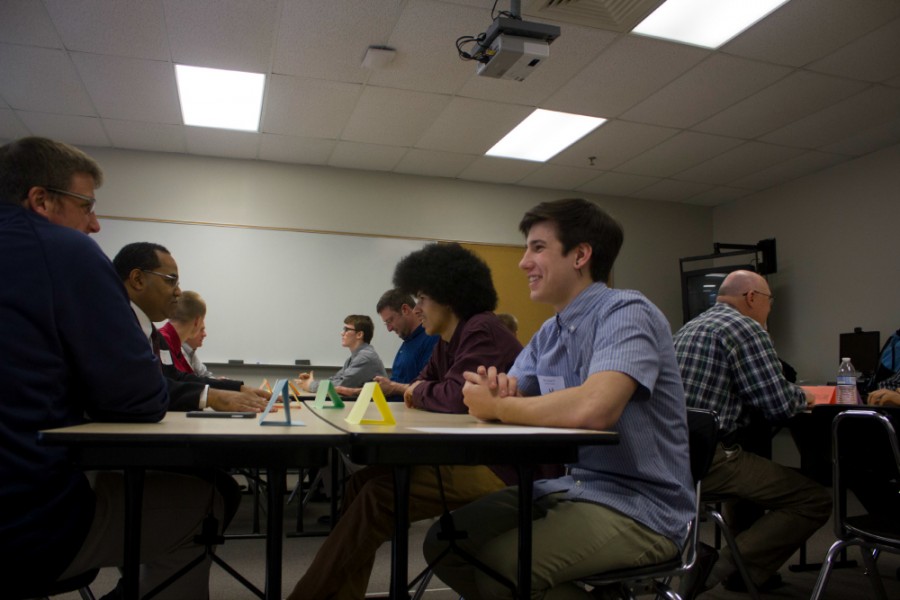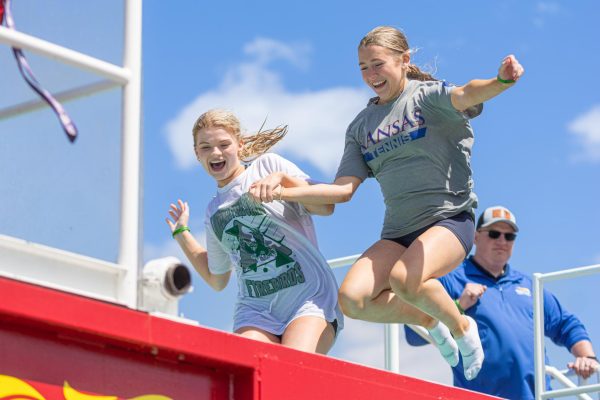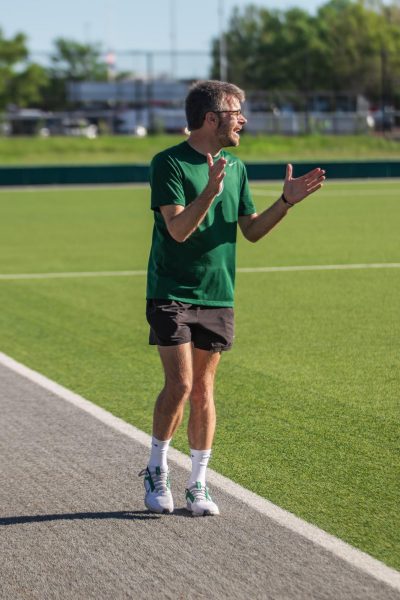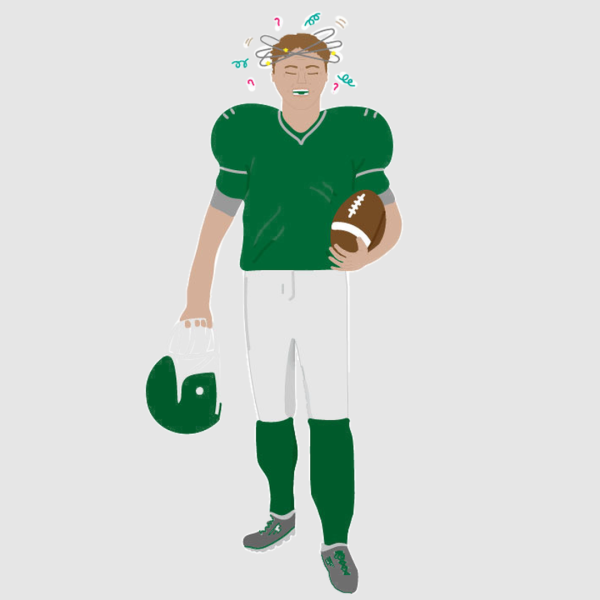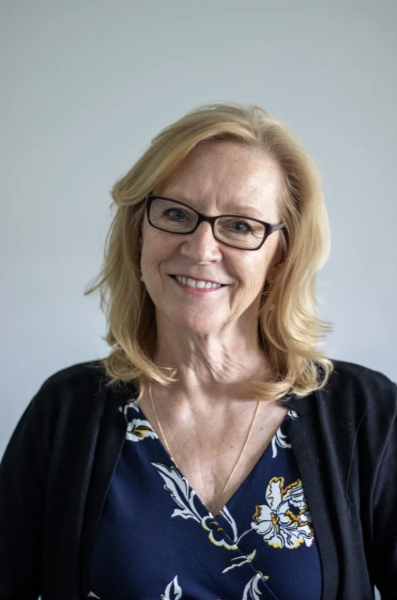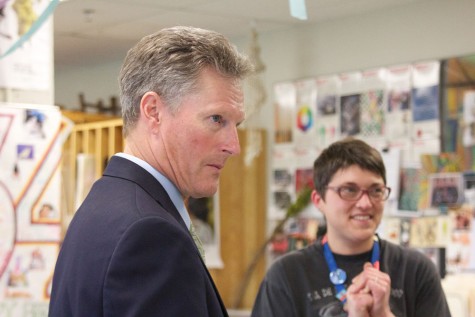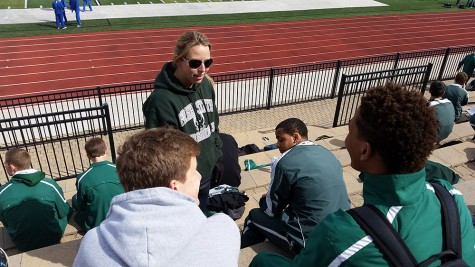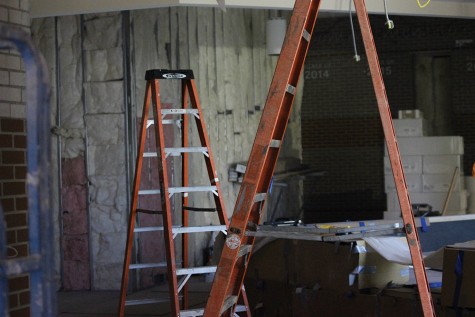Male students, community leaders partner in pilot program
Junior Donovan Young and sophomore Arlo March, students selected to be in the Ambassador Program, get to know their business partners before the start of the programs’s second meeting. The students were selected based on counselor recommendations.
As sophomore Diallo Jackson walked down the hall to the office with a pass from assistant principal Keith Jones in his hand, Jackson worried he might be in trouble.
Before winter break, Jackson and 14 other Free State male students were selected to be a part of the Ambassador program, a pilot program created by the Free State Lawrence Education Achievement Partners (LEAP) and Jones.
Male students of all races and academic status from grades nine through 12 were chosen as “ambassadors” to be mentored by male Lawrence community leaders.
Jones took recommendations from counselors to decide which students would represent Free State.
Students and their mentors will meet five times during the year over lunch. The first meeting started in the library classroom with a lunch provided by Free State on Jan. 28. Afterwards, the students gave tours to their mentors.
Jones hopes, through the Ambassador program, the school’s partnership with local businesses and the students’ networking abilities can be enhanced.
“One, I want to strengthen the partnerships with our business communities, and two, get more males involved in our programs, and three to get some of the kids to develop their leadership skills and to get something from the partners,” Jones said.
He also sees the community leaders playing a role in the classroom. Eventually Jones would like to see these leaders become guest speakers in Free State’s classes.
![Waiting for the meeting to begin, sophomore Drake Calub talks with Calvin McConnell, assistant director of freshman recruitment at the University of Kansas, The lunch meeting took place on Jan. 28 in the library classroom and the Commons. "[The program] is a great way to expand [our] varieties on what [we] want to do in the future," Calub said.](https://www.fsfreepressonline.com/wp-content/uploads/2015/02/IMG_9858-317x475.jpg)
Waiting for the meeting to begin, sophomore Drake Calub talks with Calvin McConnell, assistant director of freshman recruitment at the University of Kansas, The lunch meeting took place on Jan. 28 in the library classroom and the Commons. “[The program] is a great way to expand [our] varieties on what [we] want to do in the future,” Calub said.
“I think the ambassadors or the mentors ought to be somebody that a student can talk to,” Doll said.
Doll hopes mentors can help students with “navigating the system.”
Jackson agrees that he and some of the other boys in the program may need some help maneuvering life in high school.
“We tend to do silly things that get us in trouble,” Jackson said.
A concern has been raised that the program does not include females. According to LEAP committee member Jane Rock, the decision to have male-only mentors was partially based on the assumed preference of the community leaders.
“I don’t think you would find many males to come in and mentor a teenage girl,” Rock said. “I think it might be a little easier for [a] male to talk [to a] male than a female to a male. They didn’t even check [whether there were females available] because their goal was to do it with males.”
Jones felt the school would benefit the most from male mentors because he said most of the faculty is female.
“Only a third of them (faculty members) are male,” Jones said. “Just having a male presence here makes a big difference.”
While the Ambassador program is currently only for males, Jones thinks it could open up to females in the future.
“This is a pilot program and will continue to grow as we look to enhance the program by reaching out to more Free State students and business [and] community partners,” Jones said.
Doll believes another reason the program is focused on males centers around discrepancies between male and female graduation rates in recent years.
![During a lunch meeting for the Ambassador program, sophomore Arlo March talks with Colby Wilson, director of the Lawrence Boys and Girls Club. The program partners adolescent boys with community businessmen to discuss future career paths. "[The program] is definitely a learning experience for [students]," March said. "It's just cool to interact with adults."](https://www.fsfreepressonline.com/wp-content/uploads/2015/02/IMG_9895-1-317x475.jpg)
During a lunch meeting for the Ambassador program, sophomore Arlo March talks with Colby Wilson, director of the Lawrence Boys and Girls Club. The program partners adolescent boys with community businessmen to discuss future career paths. “[The program] is definitely a learning experience for [students],” March said. “It’s just cool to interact with adults.”
When the numbers were divided by race and gender, the difference between the number of male and female graduates was most distinct with a 23.1 percent gap between African-American males and females. While 97 percent of African-American females graduated in 2014, only 74.1 percent of African-American males did.
“We can celebrate a 93 percent [overall] graduation rate, which is up a lot from five or six years ago,” Doll said. “… Then you redouble your efforts to try to take the data you have and solve the next piece of that puzzle. The puzzle for us continues to be race, and the puzzle for us continues to be gender.”
At their Jan. 26 meeting, school board members were presented with this information.
“I was previously aware that females are going to on to postsecondary educational institutions at higher rates than males, so it wasn’t extremely surprising that graduation rates mirrored this trend,” said Vanessa Sanburn, school board vice president. “I was most surprised by the discrepancy between black males and females—it really illustrates our need to examine and tailor our equity efforts to address this gender gap.”
School board President Shannon Kimball noted that along with initiatives like the Ambassador program, blended learning programs could assist in closing the gender gap at earlier ages.
“I think we need to be looking at what we are doing in middle school and even at elementary school,” Kimball said. “Students don’t decide suddenly as ninth or 10th graders to drop out of high school.”
Kimball also mentioned the importance of reaching out to all genders and races instead of solely focusing on one group.
While male graduation rates lag behind, some female students struggle as well.
“Historically women fall off pretty significantly in math and science starting around eighth grade,” said Katie Batza, assistant professor at the University of Kansas Department of Women, Gender and Sexuality Studies.
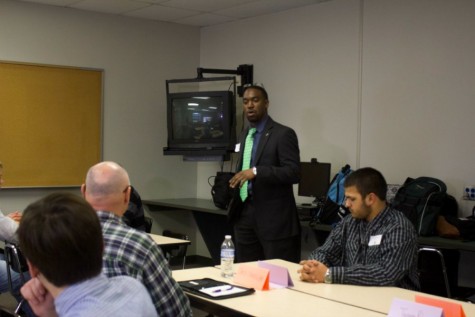
Speaking to a room of male students and community leaders, assistant principal Keith Jones begins the Ambassador program’s first formal meeting. Students discussed their school performance and involvement with their assigned mentors.
Kimball and Sanburn both expressed a desire for females to be included in future initiatives and in the Ambassador program.
“If there are female students interested in the program who have been turned away, I would suggest we look for opportunities to meet their needs,” Sanburn said.
For Jackson, he hopes his ambassadorship leads him in a better direction.
“I look at it like it’s a blessing for me and an opportunity to keep me on the right path,” Jackson said. “I don’t want to be just some guy, 21, living with my parents.”
Editor’s Note: On Jan. 29, the American Civil Liberties Union sent a letter to Superintendent Dr. Rick Doll asking for Free State to suspend the Ambassador program and asserting the program violates Title IX.
“The two reasons we mainly chose to start with young men in this pilot program were because the goal is to get men more involved in our school and the data reflects that our young women are achieving academically at a higher rate than our young men,” Jones said.



